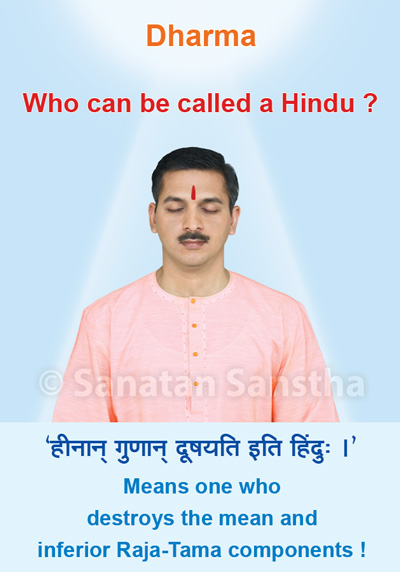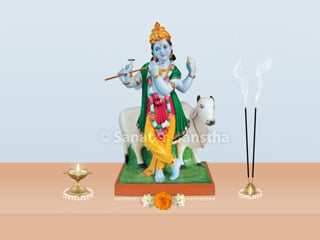
The Holy text Merutantra defines the origin of the word ‘Hindu’ (हिंदु) as ‘हीनान् गुणान् दूषयति इति हिंदुः ।’ means that which destroys the mean and inferior Raja-Tama components. One who rejects the inferior Raja-Tama components and the resultant physical, verbal and mental inferior activities, and one who is engrossed in the Sattva predominant component and therefore, considers devotion unto God as the essence of life and thereby seeks God and further, strictly adheres to Karmayoga (Path of Action) so as to guide the society, is to be termed ‘Hindu’. Such is the expanded origin of the word Hindu. Thus, the term Hindu is an attitude (Sattva predominant). – H.H. Kane Maharaj, Narayangaon, District Pune, Maharashtra.
The sole eternal goal of Spirituality as perceived by Hindu Dharma is to display the God Principle in human beings, rather bring about the manifestation of God in them. – Shri Aurobindo (Vandemataram, 24.6.1908)
1. Special features
A. ‘The sole eternal goal of Spirituality as perceived by Hindu Dharma is to display the God Principle in human beings, rather bring about the manifestation of God in them.
B. Our Dharma provides education on the art of loving others.
C. Granting Sagehood and Incarnation status to opponents : Charvak (an ancient great intellectual) did not believe in either God or rebirth. Yet, far from being tortured, he was proclaimed a Sage instead ! Siddharth Gautam denied the existence of God and criticised prevalent Yadnya-yāg (Ritual of sacrifi cial fi res). He was given the status of a Deity and was considered as an Incarnation of Shrīvishṇu ! Even the atheist Mahavir was given the status of a Deity.
D. ‘Hindu Dharma is so very flexible that such extreme flexibility will not be found in any other religion. Therefore, it can be said that all other sects are derivatives and sub-derivatives of our Dharma.’ – Swami Vivekanand
2. Importance
A. Boundless love unto the feet of God, and that love being in a state of continuous offering, is a mark of the Hinduism of Hindus.
B. Hindutva (seeker qualities) is a permanent character of a human mind and hence, unless one imbibes those qualities, God-realisation, which is the ultimate aim of human birth, can never be achieved. It is through education on Dharma that the desired state of the human mind can be attained.
3. Who can be called a Hindu ?
A. ‘The one who accepts the Vedas, Vedangs (Six sciences related to the Vedas) and the Purans and their corresponding sects and who is born in a traditional Hindu family is a Hindu.
B. The one who wholeheartedly accepts the definition above as the authority is also called a diksha-hindu, meaning ‘Hindu by initiation’.
C. One who does not believe in the Vedas, Vedangs and the Purans and their corresponding sects, but who is born to Hindu parents is a ‘Janamartha’, meaning a Hindu by birth. Vedas, Vedangs and the Puraṇas well as their corresponding sects are undoubtedly superior; but in their absence, I consider a Hindu by initiation to be superior from the point of view of worship. However, in matters of marriage, always a Hindu by birth should be chosen.

 Maghi Shri Ganesh Jayanti 2024
Maghi Shri Ganesh Jayanti 2024 Partial lunar eclipse of October 2023 – Do’s and Don’ts
Partial lunar eclipse of October 2023 – Do’s and Don’ts Main places of pilgrimage of Deity Datta
Main places of pilgrimage of Deity Datta Photographic Divine vision of some places which have experienced Shrikrishna’s blissful presence !
Photographic Divine vision of some places which have experienced Shrikrishna’s blissful presence ! Jananashanti ritual for baby born in an inauspicious period
Jananashanti ritual for baby born in an inauspicious period Mangaldosh – concept and misconceptions
Mangaldosh – concept and misconceptions
Very nice Blog, easy to understand
सनातन एवं हिंदू धर्म के विषय में मेरी जनने की जिज्ञासा तथा मेरे ईष्ट देव शिव शंभू की कृपा से मेरी जिज्ञासा को शांत करने के लिए आपके इस ब्लॉग को पढ़ने का सौभाग्य प्राप्त हुआ उसके लिए मैं अपने इष्ट देव शिव शंभू एवं संस्था के संस्थापक का हृदय से आभार व्यक्त करता हूं,
विश्व एवं भारत मैं सनातन व्यवस्था एवं हिंदू धर्म को सही स्थान दिलाने के लिए जिस भी ज्ञान एवं शास्त्र की आवश्यकता होगी
आशा करता हूं मुझे आपके संस्थान एवं सनातन के प्रबुद्ध ज्ञानियों के सहयोग प्राप्त होती रहेगी
धन्यवाद
शिव शंभू सनातनी